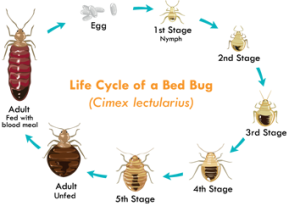Kings Exterminator Cincinnati: Efficient Bug Monitoring
Kings Exterminator Cincinnati: Efficient Bug Monitoring
Blog Article
Kinds Of Parasite Control: Which Technique Is Right for Your Invasion?
When faced with a bug invasion, the selection of a suitable approach for parasite control is important in successfully managing the scenario. By discovering the various kinds of pest control approaches offered, people can make enlightened decisions tailored to their special conditions, making sure a much more sustainable and effective outcome in insect eradication.
Chemical Pest Control
Chemical bug control entails the usage of artificial or normally obtained chemicals to manage and eradicate pest populaces properly. This technique is generally utilized in farming, forestry, and household setups to battle a large range of bugs, consisting of weeds, pests, and rodents. Making use of chemical pesticides can offer quick and targeted remedies to pest problems, making it a prominent option for many individuals and companies.
Among the essential benefits of chemical bug control is its ability to swiftly get rid of parasites, lowering the danger of damages to plants, residential or commercial property, and human health and wellness. By making use of certain chemicals that target certain parasites, this method can successfully control problems while minimizing harm to valuable organisms and the environment when used appropriately.
However, using chemical insect control also elevates problems concerning potential damaging impacts on non-target species, water resources, and human health. It is essential to follow security guidelines, use chemicals properly, and think about different parasite control approaches to minimize these dangers and guarantee lasting insect administration methods.
Organic Pest Control
Biological pest control, likewise referred to as biocontrol, utilizes living microorganisms to take care of and reduce pest populaces normally. This technique takes advantage of the power of nature to manage insects without the requirement for synthetic chemicals. Biocontrol can include the introduction of natural opponents of the bug species, such as pathogens, bloodsuckers, or killers, to reduce pest populations. By making use of the insect's all-natural killers or microorganisms, biological insect control supplies a eco friendly and lasting service to pest management.

Mechanical Parasite Control
Using manual and physical methods to take care of bug populations, mechanical parasite control supplies an alternate method that does not count on the usage of living microorganisms or artificial chemicals. This approach entails using barriers, catches, or various other gadgets to literally discourage or remove parasites. By blocking pest entrance factors or setting up catches to capture them, mechanical insect control can successfully lower infestations without presenting chemicals right into the setting.
One common example of mechanical parasite control is making use of mesh screens on doors and windows to stop bugs from going into buildings. This simple yet efficient technique acts as a physical obstacle, keeping bugs out while permitting appropriate air flow. Additionally, gadgets like mousetraps, fly swatters, and ultrasonic repellents fall under the mechanical bug control category.
While mechanical parasite control methods can be labor-intensive and require normal surveillance and upkeep, they supply a sustainable and eco friendly service for managing parasite problems. By integrating different mechanical methods, homeowner can develop a thorough pest control approach that decreases reliance on chemical pesticides.
Physical Parasite Control

Some common physical insect control techniques include making use of barriers such as displays or webs to avoid pest entry, catches to record and eliminate pests, and hand-picking to physically eliminate insects from plants or structures. Additionally, strategies like warmth treatments can be utilized to regulate insects like bed insects by elevating the temperature to degrees that are deadly to the pests.
Physical insect control is specifically beneficial in integrated pest management (IPM) approaches, where several bug control methods are integrated for effective pest management while reducing using chemicals. By making use of physical insect control techniques, individuals can effectively attend to insect invasions with minimal environmental impact.
Integrated Bug Management
When applying physical bug control approaches as component of insect administration approaches, Integrated Parasite Administration (IPM) arises as a detailed approach that leverages various methods to effectively manage pest populations. IPM concentrates on lasting prevention of bugs via a mix of organic, cultural, physical, and chemical tools tailored to certain insect problems. By incorporating multiple control strategies, IPM aims to lessen the dangers linked with pests while also reducing reliance on chemical remedies.
One trick facet of IPM is the emphasis on commercial pest management surveillance and analyzing pest populaces to establish the most ideal control methods. This aggressive approach permits for very early intervention and targeted methods, causing much more efficient insect management. In addition, IPM promotes eco-friendly practices by prioritizing non-chemical control methods and only making use of pesticides as a last hope.
Conclusion

By utilizing the bug's natural killers or microorganisms, biological parasite control uses a sustainable and environmentally pleasant service to pest administration. - Kings pest control Cincinnati Ohio
Making use of physical and hands-on approaches to manage parasite populations, mechanical insect control uses a different method that does not count on the use of living organisms or artificial chemicals.An efficient technique to managing parasite populaces without depending on chemical or biological methods includes the use of physical parasite control methods.When applying physical parasite control methods as component of pest management approaches, Integrated Parasite Monitoring (IPM) arises as a comprehensive technique that leverages numerous methods to effectively regulate pest populaces. Chemical pest control involves the use of pesticides, biological bug control utilizes all-natural predators, mechanical pest control involves physical barriers, physical bug control includes capturing or getting rid of insects, and incorporated parasite management integrates numerous approaches for an all natural technique to pest control.
Report this page